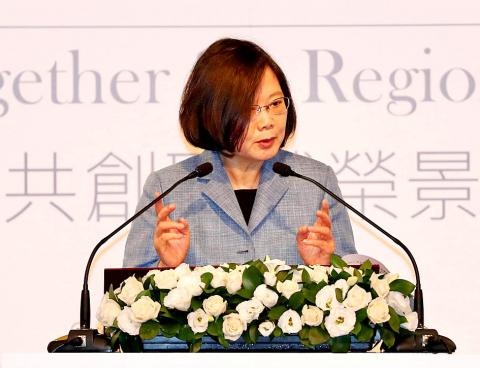The New Southbound Policy launched by her administration after her inauguration two years ago is bearing fruit with closer ties in terms of trade, and economic and cultural exchanges between Taiwan and nations targeted by the policy, President Tsai Ing-wen (蔡英文) said yesterday.
In an address at the opening of the Yushan Forum in Taipei, Tsai said there have been some significant results since the policy’s launch.
For instance, in the first half of this year, Taiwan welcomed more than 41,000 students from New Southbound nations, she said, adding that the number would rise again next year as the government has set a goal of 48,000 students.

Photo: CNA
“Our young people are also choosing New Southbound countries as their study destination. Last year, the number of Taiwanese students studying in those countries increased by nearly 20 percent [compared with the previous year],” she said.
In addition, more than 4 million tourists have visited Taiwan over the past two years from New Southbound Policy nations, which is helping to forge closer people-to-people ties, she added.
Bilateral trade between Taiwan and those nations has also increased significantly, Tsai said.
“Last year alone, bilateral trade between Taiwan and New Southbound countries grew by around 15 percent year-on-year. Taiwan’s investment in those countries rose by 54 percent and approved investment from those countries in Taiwan also increased by about 15 percent,” she said.
The president said the two-day Yushan Forum, which was launched last year to promote Taiwan’s regional status and support the government’s efforts to forge a broader relationship with nations targeted by the New Southbound Policy, is a “unique platform celebrating diversity, innovation and progressive values.”
Tsai said she hopes the forum will become one of Asia’s premier events on regional affairs and cooperation.
To conclude her remarks, she borrowed a quote from former Philippine vice president Teofisto Guingona Jr, who said at last year’s inaugural Yushan Forum: “We help each other. The Philippines to help Taiwan, and Taiwan to help the Philippines.”
Tsai said the quote exemplified the spirit of the forum and the New Southbound Policy as a whole, which is “Taiwan can help Asia, and Asia can help Taiwan.”
Forty-eight speakers from 18 nations are attending the forum.

MAKING WAVES: China’s maritime militia could become a nontraditional threat in war, clogging up shipping lanes to prevent US or Japanese intervention, a report said About 1,900 Chinese ships flying flags of convenience and fishing vessels that participated in China’s military exercises around Taiwan last month and in January last year have been listed for monitoring, Coast Guard Administration (CGA) Deputy Director-General Hsieh Ching-chin (謝慶欽) said yesterday. Following amendments to the Commercial Port Act (商港法) and the Law of Ships (船舶法) last month, the CGA can designate possible berthing areas or deny ports of call for vessels suspected of loitering around areas where undersea cables can be accessed, Oceans Affairs Council Minister Kuan Bi-ling (管碧玲) said. The list of suspected ships, originally 300, had risen to about

DAREDEVIL: Honnold said it had always been a dream of his to climb Taipei 101, while a Netflix producer said the skyscraper was ‘a real icon of this country’ US climber Alex Honnold yesterday took on Taiwan’s tallest building, becoming the first person to scale Taipei 101 without a rope, harness or safety net. Hundreds of spectators gathered at the base of the 101-story skyscraper to watch Honnold, 40, embark on his daredevil feat, which was also broadcast live on Netflix. Dressed in a red T-shirt and yellow custom-made climbing shoes, Honnold swiftly moved up the southeast face of the glass and steel building. At one point, he stepped onto a platform midway up to wave down at fans and onlookers who were taking photos. People watching from inside

Japan’s strategic alliance with the US would collapse if Tokyo were to turn away from a conflict in Taiwan, Japanese Prime Minister Sanae Takaichi said yesterday, but distanced herself from previous comments that suggested a possible military response in such an event. Takaichi expressed her latest views on a nationally broadcast TV program late on Monday, where an opposition party leader criticized her for igniting tensions with China with the earlier remarks. Ties between Japan and China have sunk to the worst level in years after Takaichi said in November that a hypothetical Chinese attack on Taiwan could bring about a Japanese

The WHO ignored early COVID-19 warnings from Taiwan, US Deputy Secretary of Health and Human Services Jim O’Neill said on Friday, as part of justification for Washington withdrawing from the global health body. US Secretary of State Marco Rubio on Thursday said that the US was pulling out of the UN agency, as it failed to fulfill its responsibilities during the COVID-19 pandemic. The WHO “ignored early COVID warnings from Taiwan in 2019 by pretending Taiwan did not exist, O’Neill wrote on X on Friday, Taiwan time. “It ignored rigorous science and promoted lockdowns.” The US will “continue international coordination on infectious